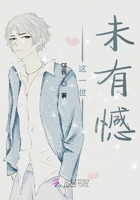Young Bernenstein interrupted his cheering with a short laugh, but fell to his task again in a moment. I had recovered my senses by now, and stood panting, looking down on the crowd. It was growing dusk and the faces became blurred into a white sea. Yet suddenly I seemed to discern one glaring up at me from the middle of the crowd--the pale face of a man with a bandage about his head. I caught Bernenstein's arm and whispered, "Bauer," pointing with my finger where the face was. But, even as I pointed, it was gone; though it seemed impossible for a man to move in that press, yet it was gone. It had come like a cynic's warning across the scene of mock triumph, and went swiftly as it had come, leaving behind it a reminder of our peril. I felt suddenly sick at heart, and almost cried out to the people to have done with their silly shouting.
At last we got away. The plea of fatigue met all visitors who made their way to the door and sought to offer their congratulations; it could not disperse the crowd that hung persistently and contentedly about, ringing us in the palace with a living fence. We still heard their jests and cheers when we were alone in the small saloon that opens on the gardens. My wife and I had come here at Rudolf's request; Bernenstein had assumed the duty of guarding the door. Evening was now falling fast, and it grew dark. The garden was quiet; the distant noise of the crowd threw its stillness into greater relief. Rudolf told us there the story of his struggle with Rupert of Hentzau in the attic of the old house, dwelling on it as lightly as he could.
The queen stood by his chair--she would not let him rise; when he finished by telling how he had burnt her letter, she stooped suddenly and kissed him off the brow. Then she looked straight across at Helga, almost defiantly; but Helga ran to her and caught her in her arms.
Rudolf Rassendyll sat with his head resting on his hand. He looked up once at the two women; then he caught my eye, and beckoned me to come to him. I approached him, but for several moments he did not speak. Again he motioned to me, and, resting my hand on the arm of his chair, I bent my head close down to his. He glanced again at the queen, seeming afraid that she would hear what he wished to say.
"Fritz," he whispered at last, "as soon as it's fairly dark I
must get away. Bernenstein will come with me. You must stay here."
"Where can you go?"
"To the lodge. I must meet Sapt and arrange matters with him."
I did not understand what plan he had in his head, or what scheme he could contrive. But at the moment my mind was not directed to such matters; it was set on the sight before my eyes.
"And the queen?" I whispered in answer to him.
Low as my voice was, she heard it. She turned to us with a sudden, startled movement, still holding Helga's hand. Her eyes searched our faces, and she knew in an instant of what we had been speaking. A little longer still she stood, gazing at us.
Then she suddenly sprang forward and threw herself on her knees before Rudolf, her hands uplifted and resting on his shoulders.
She forgot our presence, and everything in the world, save her great dread of losing him again.
"Not again, Rudolf, my darling! Not again! Rudolf, I can't bear it again."
Then she dropped her head on his knees and sobbed.
He raised his hand and gently stroked the gleaming hair. But he did not look at her. He gazed out at the garden, which grew dark and dreary in the gathering gloom. His lips were tight set and his face pale and drawn.
I watched him for a moment, then I drew my wife away, and we sat down at a table some way off. From outside still came the cheers and tumult of the joyful, excited crowd. Within there was no sound but the queen's stifled sobbing. Rudolf caressed her shining hair and gazed into the night with sad, set eyes. She raised her head and looked into his face.
"You'll break my heart," she said.















